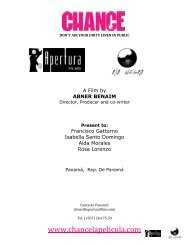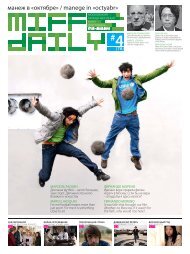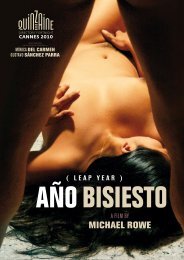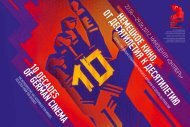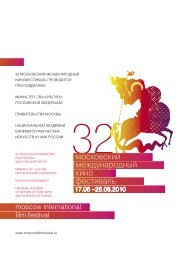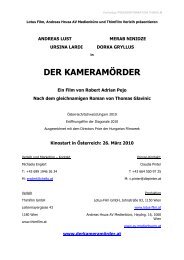press-release
press-release
press-release
Create successful ePaper yourself
Turn your PDF publications into a flip-book with our unique Google optimized e-Paper software.
A Film Unfinished<br />
A documentary film by Yael Hersonski<br />
Producers: Noemi Schory & Itay Ken-Tor, Belfilms Ltd.<br />
89’, English, Hebrew, German, Polish, Yiddish with English subtitles, Israel 2010<br />
"History decomposes into images, not into narratives." (Walter Benjamin)<br />
A film about an unfinished film which portrays the people behind and before the<br />
camera in the Warsaw Ghetto, exposing the extent of the cinematic<br />
manipulation forever changing the way we look at historic images.<br />
Screenings in Berlin<br />
Monday 15.02 CineStar 7 14:30 (European Premiere)<br />
Tuesday 16.02 MGB Kinosaal 09:00 (Market Screening)<br />
Tuesday 16.02 CineStar 7 12:00<br />
Wednesday 17.02.10 Colosseum 1 15:30
Synopsis<br />
This film is the quest for the truth behind one of the most mysterious Nazi propaganda films<br />
ever shot in the Warsaw Ghetto. The film, which was shot just a short time before the<br />
deportation of the inhabitants of the ghetto, is a rough first draft of a silent film that juxtaposes<br />
meticulously staged scenes of Jews enjoying a life of luxury in the ghetto with other, chilling<br />
images that required no staging at all.<br />
Ironically, after the war, filmmakers and museums used images from the film as objective<br />
illustrations of the narratives they had collected from witnesses and written documents. Few<br />
people were aware of the cynical manner in which these images were created and the true,<br />
yet inconceivable witness they bear. The cinematic deception was forgotten and the black<br />
and white images remain engraved in memory as historical truth. Documents revealing who<br />
initiated the project and why it was never completed have yet to be found.<br />
The film interweaves diary entries written by ghetto inhabitants during the filming, the<br />
testimonies of a few living survivors and the protocol of the interrogation of one of the<br />
German cameramen testifying about the filming.<br />
By juxtaposing the filmed scenes with this behind the scenes testimony, this film reveals how<br />
the Nazis used the Ghetto as a film-set, the inhabitants as actors, and the decaying bodies<br />
as exhibits.<br />
A Film Unfinished shakes our confidence in the photographic image and the way we think we<br />
know our history.
Background<br />
The Warsaw Ghetto was the largest of the Jewish ghettos during World War II. The<br />
population was estimated to be 440,000 people. Thousands of Polish Jews as well as some<br />
Roma from the countryside were continuously brought into the Ghetto. Typhus, starvation,<br />
and random killings kept the number of inhabitants more or less constant.<br />
Average food rations in 1941 for Jews in Warsaw were limited to only 184 kcal per day. Thus<br />
over 100,000 of the Ghetto's residents died even before the Nazis began massive<br />
deportations of the inhabitants from the Ghetto to the Treblinka extermination camp.<br />
Between July 23 and September 1942, about 254,000 of the Ghetto residents were sent to<br />
Treblinka and murdered there.
The Director's Statement<br />
The Holocaust confronted humanity not only with inconceivable horrors but also, for the first<br />
time, with their systematic documentation. More than anything else, it is the photographic<br />
documentation of these horrors that has changed forever the way in which the past is<br />
archived. Atrocities committed by the Nazis were photographed more extensively than any<br />
evils, before or after. Yet since the war, these images, created by the perpetrators, have<br />
been subjected to mistreatments: in the best of cases they were crudely used as illustrations<br />
of the many stories; in the worst, they were presented as straightforward historical truth.<br />
With the prospect in mind of a time when no survivor will be left to remember the events, I<br />
tried in this film to examine the silent footage, which alone will remain; to critically inspect the<br />
potential of the photographic image to bear witness as well as the limits of its ability to do so.<br />
In what ways can archival footage filmed by the perpetrators testify to the suffering of the<br />
victims? And in the case of Nazi propaganda footage, where does cinematic manipulation<br />
end and reality begin?<br />
For me, it begins with the victim’s gaze into the camera. That gaze contains what is perhaps<br />
the only emotional truth not crushed under the wheels of propaganda, the only truth that<br />
cannot be possessed and that remains forever, as if to testify: "I was there, I existed in this<br />
world that words cannot describe".<br />
I wanted to expose the message enfolded in this captured gaze, but at the same time also to<br />
question the twenty-first-century viewer's perception of the past,: to undermine his<br />
confidence in his knowledge of history and reinforce his emotional ability to see beyond the<br />
layers of time.<br />
Yael Hersonski
YAEL HERSONSKI, Director<br />
2, Hamelitz St., Tel-Aviv, ISRAEL, 63295<br />
Mobile: +972-54-2331611 Fax: +972-3-5590784<br />
E-Mail: yael.hersonski@gmail.com<br />
Yael Hersonski has been working as a freelance director and editor since graduating with<br />
high honors from the Sam Spiegel Film & Television School seven years ago. After serving<br />
as the content editor of the chief weekly documentary program of Channel 10 (an Israeli<br />
commercial television station), which won the Israeli Academy Award for the best<br />
documentary television program in 2004, she currently edits documentary and fictional drama<br />
programs for Israeli television. A Film Unfinished is her first feature documentary film.<br />
Born in Israel, 1976<br />
Education:<br />
1998-2003<br />
1996-1998<br />
Film studies at the Sam Spiegel Film & Television School, Jerusalem<br />
Philosophy studies at Tel-Aviv University<br />
Films:<br />
2009<br />
Director of A Film Unfinished, a feature-length documentary film.
Noemi Schory & Itay Ken-Tor, Producers<br />
Noemi Schory, documentary film director and producer, founded Belfilms in 1988 as an<br />
independent production house, active in Israeli and many international co-productions,<br />
primarily in the documentary field.<br />
In 2005 was elected president of Input, the international public television conference.<br />
Itay Ken-Tor, graduate of the Tel Aviv university department of film & television, is a<br />
documentary film director and producer. Since 2000 he has been working at Belfilms as<br />
director and producer of documentary series as well as single feature documentaries .In the<br />
last 3 years has been managing Belfilms.<br />
BELFILMS LTD.<br />
A film and television Production House based in Tel Aviv, Israel founded in 1984 by Katriel<br />
and Noemi Schory and managed by Itay Ken-Tor.<br />
BELFILMS Is one of the leading production houses in Israel, producing for Israeli and<br />
foreign broadcasters amongst them are the BBC, Arte, ZDF, SBS, TV2, YLE, VPRO and<br />
more.<br />
BELFILMS' is the only Israeli company selected for the world’s top 100 influential<br />
production houses list of the RealScreen magazine 2006.
Belfilms Productions<br />
"Life in an Enclave", Israel, 2009, documentary, 3x 52 min.<br />
Portraits and dilemmas of the Ultra-orthodox society in Israel.<br />
Directed by Ron Ofer & Yohai Hakak<br />
Produced for Keshet, Channel 2<br />
Best TV Documentary, Religion Today festival, Trento<br />
"Paris Retour", Israel, 2009, documentary, 70 min., An intimate portrait of affection<br />
surviving old age, looking with fear at the years ahead.<br />
Directed by Yossi Aviram<br />
Produced for Yes Docu, ZDF/ARTE, ERT<br />
"Voices from El -Sayed", Israel, 2008, documentary, 73 min.<br />
The story of the largest deaf community in the world in a Bedouin village in southern Israel.<br />
Directed by Oded ( Adumi) Leshem<br />
Produced for the 2nd Authority for Television and Radio<br />
The Guggenheim Emerging Artist Award, Full Frame Festival 2009<br />
"Jerusalem Cuts", Israel, 2008, documentary, 52 min.<br />
3 different narratives of Jerusalem in 1948 as reflected in the images of a Palestinian<br />
photographer, an Israeli feature film and a British- American photo-journalist.<br />
Directed by Liran Atzmor<br />
Co-produced with BBC, ZDF/ARTE and Channel 8<br />
Yad Vashem, Israel, 2005, 93 short films for the new Historic Museum of Yad Vashem.<br />
"The Era of the Generals", Israel, 2003, 5X52 min.<br />
Documentary series about Israeli leaders which examines the impact of military thinking and<br />
training on civilian leadership.<br />
Directed by Paul Jenkins, Ruth Walk and Itay Ken-Tor<br />
Produced for BBC, ARTE, TV2(Denmark), YLE ( Finland), VPRO (Holland), VRT<br />
(Belgium), SBS (Australia), History Channel (Canada) and Channel 8 (Israel)
"The Settlers", (Tel Rumeida), Israel, 2002, documentary, 56 min.<br />
Daily life in one of the most isolated and extreme settlements in the occupied territories,<br />
Directed by Ruth Walk<br />
Co-produced with BBC, Arte, TV Ontario, the Soros Fund and the New Documentary Fund,<br />
Israel<br />
Festivals: Berlin 2002, Docaviv, Director's award- Marseille 2003<br />
"The Inner Tour", Israel, 2001, documentary, 98 min.<br />
A group of Palestinians in a bus touring Israel, places burdened by their memories, a tour in<br />
the present, a tour into the past, showing Israelis an alternative narrative of history.<br />
Directed by Ra'anan Alexandrowicz<br />
Co-produced with DAR productions, Ramalla forArte, BBC, VPRO, SVT and Telad, 2nd<br />
channel, Israel, the Soros Fund and the New Fund for documentaries, Israel<br />
Festivals: Berlin (2001), Sundance (2001), Docaviv Special Mention award<br />
"Luciano Berio", Israel, 2000, documentary, 58 min.<br />
Musical biography of composer Luciano Berio, culminating in his last operatic work "Cronaca<br />
del Luogo".<br />
Directed by Reuven Hecker<br />
Co-produced with ARTE, ORF, NOGA, the Documentary Channel Israel<br />
Festivals: FIPA 2000.
A Film Unfinished<br />
Main Credits<br />
Director:<br />
Producers:<br />
Editor:<br />
Director of Photography:<br />
Music:<br />
Sound Design:<br />
A production of:<br />
Co-produced with:<br />
In cooperation with:<br />
Supported by:<br />
World sales:<br />
Yael Hersonski<br />
Noemi Schory, Itay Ken-Tor<br />
Joëlle Alexis<br />
Itai Neeman<br />
Ishai Adar<br />
Aviv Aldema<br />
Belfilms Ltd<br />
MDR, SWR, Yes Docu<br />
Arte<br />
The New Israeli Foundation for Cinema and Television, Yad<br />
Vashem Film Project, YES Docu.<br />
Developed with the assistance of Greenhouse<br />
Cinephil, www.cinephil.co.il
Festival & Awards:<br />
World Premiere: Sundance Film Festival 2010 (World Doc Competition) – Winner Editing<br />
Award<br />
European Premiere: Berlin Film Festival 2010 (Panorama)<br />
Contacts:<br />
Producers:<br />
Noemi Schory & Itay Ken-Tor<br />
BELFILMS<br />
20 Ben-Avigdor st.<br />
Tel Aviv 67218<br />
Tel: +972 3 624 0780<br />
Fax: +972 3 6240781<br />
E: belfilms@netvision.net.il<br />
Sales Agent:<br />
Philippa Kowarsky<br />
CINEPHIL<br />
18 Levontin st.<br />
Tel Aviv 65112<br />
Tel: +972 3 5664129<br />
Fax: +972 3 5601436<br />
E: info@cinephil.co.il<br />
In Berlin: +33 6 10 29 82 18<br />
For <strong>press</strong> matters please contact Itay Ken-Tor at: kentormi@hotmail.com,<br />
mobie: +972522834077
By John DeFore, January 26<br />
Bottom Line: Harrowing Nazi footage of the Warsaw ghetto is made to reveal more than its<br />
makers intended in this historically invaluable doc.<br />
PARK CITY -- Built around a remarkable document and providing just enough supplementary<br />
material to bring it to life, "A Film Unfinished" is tough viewing but has clear value. Whether it can<br />
sustain much of a theatrical run or not, the doc could become a staple of Holocaust studies on video.<br />
The eponymous film (which director Yael Hersonski says has never been presented in its entirety) is<br />
a work of propaganda shot in the Warsaw ghetto by SS cameramen. Lacking voiceover narration or<br />
titles, its exact intentions are unclear, but the film's juxtaposition of starving Jews with privileged ones<br />
seems intended to present the ghetto's inhabitants as an inhumane community deserving of<br />
extermination.<br />
Combing through the journals of a ghetto social leader, the testimony of a Nazi cameraman, and<br />
newly discovered outtakes from the film, Hersonski reveals the extent to which these scenes were<br />
fabricated, with residents forced to put on a show to back up the official narrative.<br />
Manufactured or not, the footage affords a rare look at the life of Jews who would within months be<br />
sent to camps like Treblinka; wrenching images of the starving, the filthy, and the dead underline<br />
what we already know, while scenes like one of children who have been caught smuggling food bring<br />
the period to life in fresh, heartbreaking ways. Hersonski enriches this evidence by bringing in<br />
survivors of the ghetto, who tell stories of life there while watching the film themselves.<br />
The found footage becomes more horrific as it progresses, and by the time we see skeletal men<br />
being forced to bathe beside well-fed women, many viewers will be desperate for the doc to end.<br />
Unbelievably, "A Film Unfinished" still has one tool left: a few minutes of color footage, evidently shot<br />
by a cameraman on his own time away from the official production, that make what we've been<br />
seeing even more immediate while simultaneously giving evidence of the manipulation behind its<br />
manufacture.



